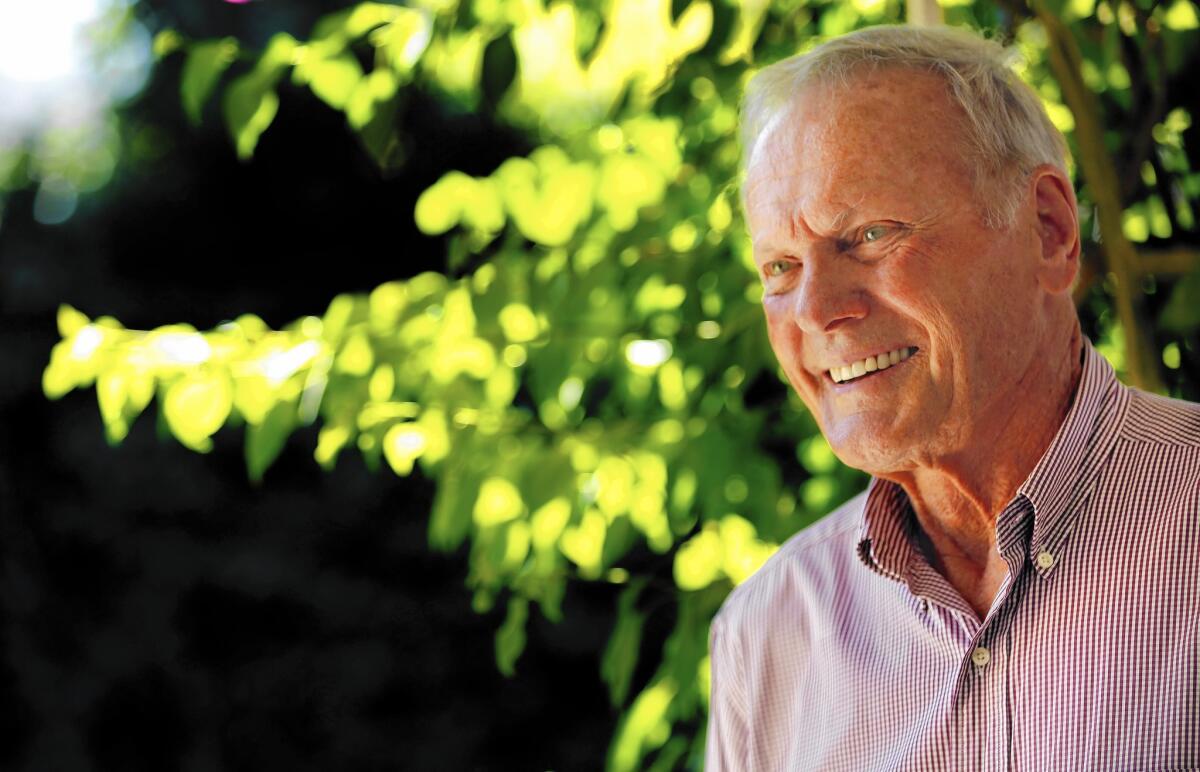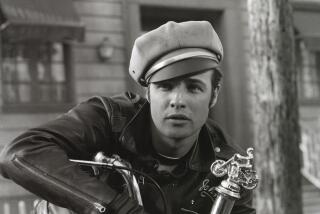Classic Hollywood: Tab Hunter gets ‘Confidential’ in a new film; his life’s just dreamy

During the 1950s, Tab Hunter seemingly had the world on a string. He was breathtakingly handsome. A top star at Warner Bros., he was best known for the 1958 musical comedy “Damn Yankees.” He had a successful recording career — “Young Love” was his biggest hit — and was one of the main heartthrobs gracing the covers of fan magazines.
But Hunter had a secret. He was gay and frightened that his career would come to a screeching halt if word got out about his sexuality.
SIGN UP for the free Classic Hollywood newsletter >>
He stayed in the closet for decades before coming out 10 years ago in his autobiography “Tab Hunter Confidential,” which he wrote with film historian Eddie Muller. A new documentary with the same title, directed by Jeffrey Schwarz, opens Friday at the Nuart Theatre in West Los Angeles. Hunter will be participating in Q&A’s on Friday, Saturday and Sunday.
A few weeks ago, Hunter and his partner of 30 years, Allan Glaser, “Confidential’s” producer, were sitting at the outdoor restaurant at the L.A. Equestrian Center in Griffith Park watching a horse competition featuring large black Friesian horses.
Horses have played an important part of Hunter’s life since his early teens. He was discovered as a teenager working with horses on a ranch in Southern California. Up until a year ago, he was competing in and judging equestrian competitions.
“Working with an animal that has a life of its own is kind of important,” Hunter said. “Horses were my touch with reality in that unrealistic world of Hollywood. I was shoveling the real stuff as opposed to the Hollywood stuff.”
Time has been kind to Hunter, who lives in Santa Barbara with Glaser. At 84, he remains youthful and fit. He has an outgoing personality but remains in many ways a private person, according to his partner.
“Tab doesn’t love talking about his sexuality,” Glaser said.
So writing the book and being interviewed extensively for the documentary was hard for him. “I got my feet wet with the book,” Hunter said.
Glaser had gotten wind that someone was planning to write a tell-all biography of Hunter. “I said if you don’t do it, someone else will.”
But it took Glaser three years of begging Hunter to agree to do the documentary. “He said, ‘Let sleeping dogs lie. I did the book — enough already.’ He doesn’t love fame, he doesn’t crave any of that. But I thought it was very important to leave a legacy for Tab, so he is more than just a footnote in Hollywood.”
He also wanted to show people that “one can go through the Hollywood machine and be OK,” Glaser said. “He went on to other things and that’s why he is a healthy, happy person today.”
Glaser’s approach to his story appealed to Hunter. “Allan wanted to do the whole journey,” Hunter noted. “It’s not just about Hollywood because that can get pretty boring.”
Not that Hunter had to worry about his life being boring. Born in New York, he moved to Southern California with his older brother and strict Catholic German émigré mother after she divorced his abusive father.
Signed by agent Henry Willson, who handled numerous handsome young leading men, he changed his name from Arthur Gelien to Tab Hunter.
While under contract to Warner Bros., Hunter appeared in such films as 1955’s action adventures “The Sea Chase” and “Battle Cry” and 1956’s “The Burning Hills” with Natalie Wood. On loan from Warner’s, he garnered good notices for his performances in 1958’s “Gunman’s Walk,” 1959’s “That Kind of Woman” with Sophia Loren and 1961’s “The Pleasure of His Company” with Debbie Reynolds and Fred Astaire.
But Hunter made a major mistake when he bought out his contract at Warner Bros. Roles were few and far between as younger actors became the dreamboats du jour.
“The studio system collapsed the same time Tab bought his contract out,” Glaser said. “Tab had no idea there was not going to be another contract waiting for him at Universal because the system had been there.”
Hunter went on the dinner-theater circuit to make money and made a delicious comeback in John Waters’ outrageous 1981 comedy hit “Polyester” with Divine.
“John was wonderful,” Hunter said. “He is like your friendly undertaker with the Adolphe Menjou mustache. I loved working for John and with Divine. I think from all the leading ladies I had, from Geraldine Page to Natalie Wood to Sophia Loren to Rita Hayworth, Divine goes right in there.”
More to Read
Only good movies
Get the Indie Focus newsletter, Mark Olsen's weekly guide to the world of cinema.
You may occasionally receive promotional content from the Los Angeles Times.







